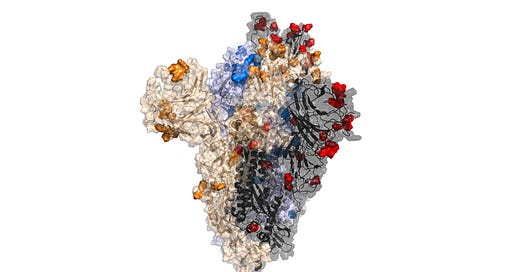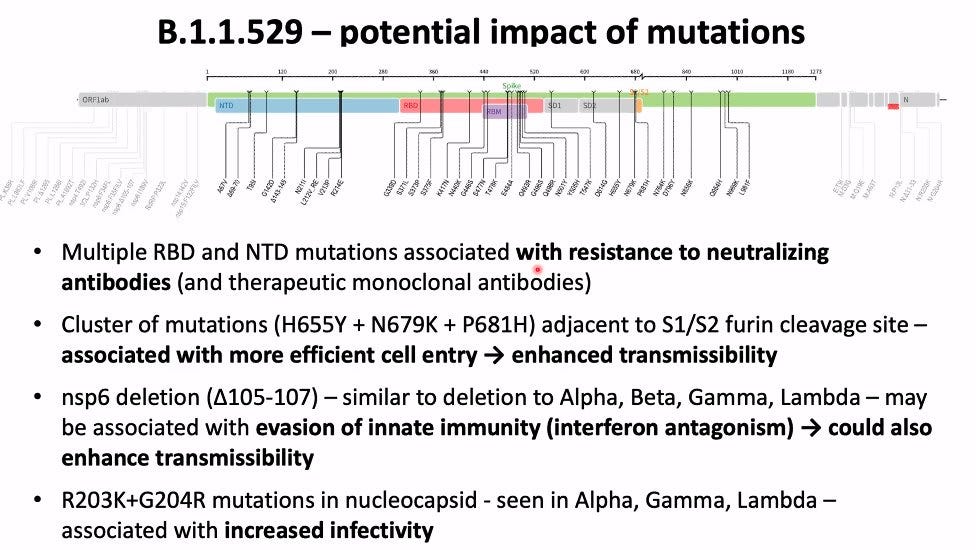A new variant - B.1.1.529 - now Omicron may be a problem. It was worth nearly 1,000 points on the Dow the day after Thanksgiving. We have had many questions this weekend about Omicron, so here we go.
B.1.1.529 was first discovered in Botswana on 11/11/21.
On 11/26/21, the World Health Organization (WHO) declared Omicron (B.1.1.529), a “variant of concern,” indicating that it carries higher risks than other virus strains.
WHO skipped Nu and Xi, presumably because of potential confusion between the former and “New” and the latter, well, you know.
Pi should be next. That might have been more fitting for a variant becoming prominent at Thanksgiving. Let’s hope we don’t get Pi for Christmas.
As of 11/27/21, cases had been identified in South Africa, Belgium, the Netherlands, the UK, Hong Kong, and probably Germany and the Czech Republic. The first cases in the United States followed within days.
It’s complicated, but Omicron is not a descendant of Delta. It has around 50 mutations, with at least 30 reportedly in RNA encoding the Spike protein. This is likely important in transmission rates because the Spike protein is critical in the viral invasion of human cells.
With any new variant, there are three important questions.
1. Is it more easily transmitted (more infectious)?
2. Is it more dangerous (more likely to kill an infected patient)?
3. Do current vaccines prevent infection with the new variant?
1. Is it more infectious?
Almost certainly, yes. Based on the data from the patients in Hong Kong, as well as the rate of infection growth in the Gauteng region of South Africa (where the test positivity rate increased from 1% to 30% in one week).
Compared to the Beta and Delta variants, B.1.1.529 appears to be much more infectious:
2. More dangerous?
Zero clinical information so far. There are worrisome specific mutation combinations, particularly in the receptor-binding domain (RBD) and N-terminal domain (NTD) in this variant. This is important because the neutralizing antibody treatments currently in use target the RBD region of the Spike protein, and mutations in that domain may render them less effective. There has been quite a bit of speculation about this in the media of course - the sky is always falling on television and the internet.
Panic is premature (as it is usually), however. We saw similar concerns about the B.1.351 (Beta) and B.1.617.2 (Delta) variant, but there was no decrease in the effectiveness of REGEN-COV1 (the most commonly used antibody treatment in our area).
3. Are vaccines effective?
Probably the most critical question is whether Omicron is a so-called “vaccine escape variant,” meaning that vaccinated populations would now be at risk for severe Covid disease.
We know very little. We do know that vaccinated individuals can be infected with Omicron (as with prior variants). But we know very few details. It’s one thing to find some viral RNA in someone’s nose, and quite another to have them sick enough to hospitalize, or to die.
The South African Health Minister announced on 11/27/21 that available vaccines effectively prevent severe disease from Omicron, but it seems premature to draw that conclusion given the relatively few cases to date. Let’s all hope this proves true.
A few additional comments:
First, travel bans do not work. On 11/26/21, President Biden banned travel from several predominantly black-population countries in Africa. This is probably neither racially-driven nor will it be any more effective than were former President Trump’s (also not racially-driven) China travel bans. It’s simply too late.2
Second, we found this virus very early, allowing public health officials and vaccine manufacturers to get a head start on responding.
Third, we now know the brand names for the Covid-19 vaccines:
Pfizer Comirnaty (combining elements of Covid, mRNA, community, and immunity); Moderna Spikevax; AstraZeneca Vaxevria; Novavax Nuvaxovid; and Sanofi Vidprevtyn.
Clearly, Moderna wins the name game with Spikevax!
Finally, if we need another vaccine, we can do this incredibly quickly with mRNA vaccine technology. There are rumors that Moderna has started to investigate whether (low-dose) boosters will have been sufficient or whether a full-dose booster or a new vaccine is needed.
REGEN-COV (casirivimab and imdevimab); see pages 43-44.
Dutch authorities said 61 of 600 passengers arriving from South Africa on two KLM flights tested positive for the coronavirus. We do not yet know whether these are Omicron, but that seems very likely.





